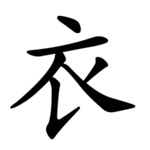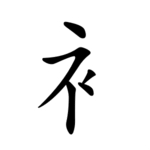Radical 145
Appearance
| 衣 | ||
|---|---|---|
| ||
| 衣 (U+8863) "clothes" | ||
| Pronunciations | ||
| Pinyin: | yī | |
| Bopomofo: | ㄧ | |
| Wade–Giles: | i1 | |
| Cantonese Yale: | yi1 | |
| Jyutping: | ji1, ji3 | |
| Japanese Kana: | イ i / エ e (on'yomi) ころも koromo (kun'yomi) | |
| Sino-Korean: | 의 ui | |
| Names | ||
| Chinese name(s): | (Left) 衣字旁 yīzìpáng (Bottom) 衣字底 yīzìdǐ | |
| Japanese name(s): | 衣/ころも koromo (Left) 衣偏/ころもへん koromohen | |
| Hangul: | 옷 ot | |
| Stroke order animation | ||
 | ||

Radical 145 or radical clothes (衣部) meaning "clothes" is one of the 29 Kangxi radicals (214 radicals in total) composed of 6 strokes. The radical character transforms into 衤 when appearing at the left side of a Chinese character.
In the Kangxi Dictionary, there are 607 characters (out of 49,030) to be found under this radical.
衣 is also the 142nd indexing component in the Table of Indexing Chinese Character Components predominantly adopted by Simplified Chinese dictionaries published in mainland China, with 衤 as its associated indexing component.
Evolution
[edit]-
Oracle bone script character
-
Bronze script character
-
Large seal script character
-
Small seal script character
Derived characters
[edit]| Strokes | Characters |
|---|---|
| +0 | 衣 衤 |
| +2 | 初 补SC (=補) |
| +3 | 衦 衧 表 衩 衪 (=袘) 衫 衬SC (=襯) |
| +4 | 衭 衮SC (=袞) 衯 衰 衱 衲 衳 衴 衵 衶 衷 衸 衹 衺 (=邪 -> 邑 斜 -> 斗) 衻 衼 衽 衾 衿 袀 袁 袂 袃 袄SC (=襖) 袅SC (=裊) 袆SC (=褘) 袇 |
| +5 | 袈 袉 袊 袋 袌 袍 袎 袏 袐 袑 袒 袓 袔 袕 袖 袗 袘 袙 袚 袛 袜SC (=襪) 袝 袞 袟 袠 (=帙 -> 巾 / 秩 -> 禾) 袡 袢 袣 袤 袥 袦 袧 袨 袩 袪 被 袬 袭SC (=襲) 袮 袰 |
| +6 | 袯SC (=襏) 袱 袲 袳 袴 (=褲 / 胯 -> 肉) 袵 (=衽) 袶 袷 袸 袹 袺 袻 袼 袽 袾 袿 裀 裁 裂 裃 裄 装SC (=裝) 裆SC (=襠) 裇 裈SC (=褌) 裉 |
| +7 | 裊 裋 裌 裍 裎 裏 裐 裑 裒 裓 裔 裕 裖 裗 裘 裙 裚 裛 補 裝 裞 裟 裠 (=裙) 裡 (=裏) 裢SC (=褳) 裣SC (=襝) 裤SC (=褲) 裥SC (=襇) |
| +8 | 裧 裨 裩 裪 裫 裬 裭 裮 裯 裰 裱 裲 裳 裴 裵 (=裴) 裶 裷 裸 裹 裺 裻 裼 製 裾 裿 褀 褁 褂 褃 褄 |
| +9 | 裦 褅 褆 複 褈 褉 褊 褋 褌 褍 褎 褏 (=袖) 褐 褑 褒 褓 褔 褕 褖 褗 褘 褙 褚 褛SC (=褸) 褜 褝 (=襌) |
| +10 | 褞 褟 褠 褡 褢 褣 褤 褥 褦 褧 褨 褩 褪 褫 褬 褭 褮 褯 褰 褱 褲 褴SC (=襤) |
| +11 | 褳 褵 褶 褷 褸 褹 褺 褻 褼 褽 褾 褿 襀 襁 襂 襃 (=褒) 襄 襅 襔 |
| +12 | 襆 襇 襈 襉 襊 襋 襌 襍 (=雜 -> 隹) 襎 襏 襐 襑 襒 襓 襕SC (=襴) |
| +13 | 襖 襗 襘 襙 襚 襛 襜 襝 襞 襟 襠 襡 襢 |
| +14 | 襣 襤 襥 襦 襧 襨 |
| +15 | 襩 襪 襫 襬 襭 襮 |
| +16 | 襯 襰 襱 襲 |
| +17 | 囊 襳 襴 襽 |
| +18 | 襵 襶 襷 |
| +19 | 襸 襹 襺 襻 襼 |
Sinogram
[edit]As an independent sinogram it is one of the kyōiku kanji or kanji taught in elementary school in Japan.[1] It is a fourth grade kanji.[1]
Look up 衣 in Wiktionary, the free dictionary.
References
[edit]- ^ a b "The Kyoiku Kanji (教育漢字) - Kanshudo". www.kanshudo.com. Archived from the original on March 24, 2022. Retrieved 2023-05-06.
Literature
[edit]- Fazzioli, Edoardo (1987). Chinese calligraphy : from pictograph to ideogram : the history of 214 essential Chinese/Japanese characters. calligraphy by Rebecca Hon Ko. New York: Abbeville Press. ISBN 0-89659-774-1.
External links
[edit]Wikimedia Commons has media related to Radical 145.




